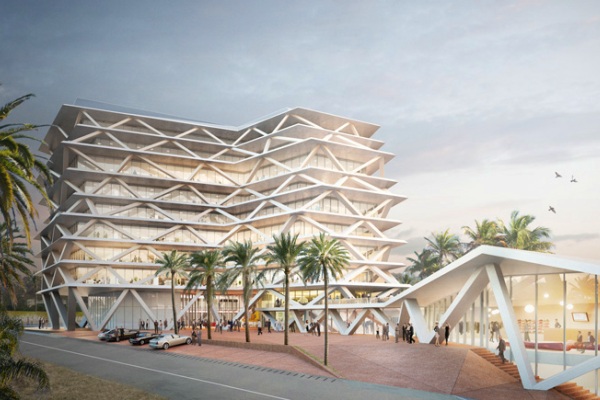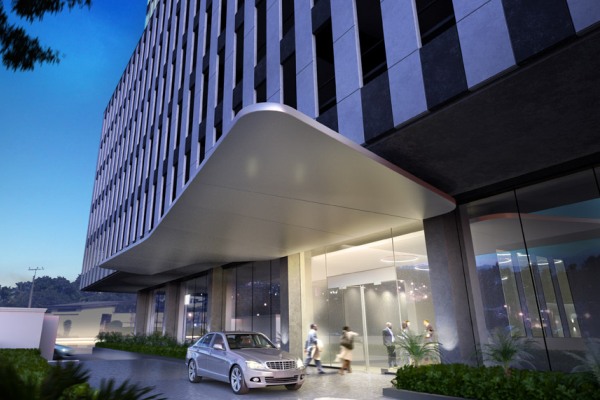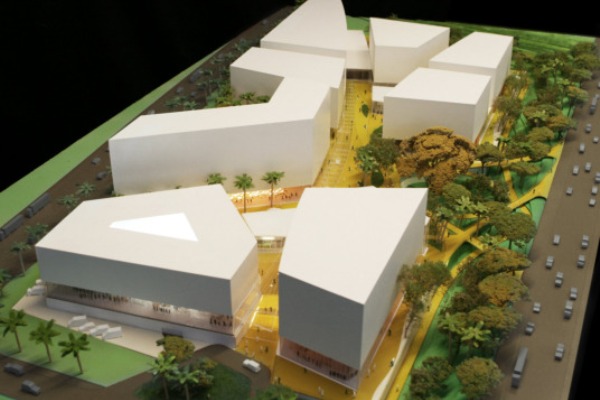Laurus Development Partners: Class A Real Estate in West Africa
Laurus Development Partners is an Actis joint-venture established to focus on property development in West Africa. Carlo Matta shares his views on the real estate sector and talks about his main projects in Ghana and Nigeria. He also discusses challenges and future developments.
Interview with Carlo Matta, CEO of Laurus Development Partners
Could you give us your views on the real estate sector at the moment? What does the future hold over the medium term for this sector?
We mitigate all the major risk in the value chain of creating a building in this market. You can definitely come here and try to do it alone, by setting up your own operations but I think it makes much more sense to partner up with a local team with track record and local knowledge that can help you hit the ground running.
I think this sector has been benefiting from a substantial improvement in the macroeconomic environment. This applies to the whole of West Africa, but particularly in Ghana where we are seeing an increased stability and solidification of the democratic process. Both Ghana and Nigeria are now democratic countries with democratic structures and a solid track record of fair elections. The Global strong demand for the natural resources have pushed up the GDP in both Ghana and Nigeria. Last year, Ghana experienced a growth in GDP of 14% and this year’s growth is projected to be around 5% or 6% and in Nigeria this year’s growth is projected to be 7%. So we are seeing substantial growth here given the gloomy current global situation. That in turn has created a strong demand for Class A real estate, both in offices and retail and also in residential properties. Both Ghana and Nigeria have seen a strong emergence of middle class; there are now a lot of people in Nigeria and Ghana with substantial disposable incomes who are demanding the quality of real estate that people can appreciate in other cities and countries around the world. Therefore we are now seeing demand for Class A office buildings, international standard retail environments and also international standard residences.
This shift started about 5 years ago and is now becoming very prominent, and while demand is strong it is coupled with a very constrained supply of real estate due to many different factors. We can probably highlight a limited presence of skills on the ground to develop large, investment grade real estate projects and a lack of funding both in terms of equity and debt, although this is improving. Despite the huge opportunities here the institutional capital is still very limited. If you compare West Africa to India for example where you have similar dynamics, in India there is a huge amount of institutional capital chasing deals whereas here in West Africa it is the other way around. There are very few institutional investors that are willing to put money and equity into real estate deals. On the other hand it is still very hard to raise debt for commercial real estate because there are not that many lenders here. Also you have the usual challenges that you see whenever you develop project on the ground: buying the right piece of land with a clean title, putting together the right consultant team and construction is still an issue here because the industry is still emerging and so from a technical stand point, you can’t build everything that you would be able to build in Europe. All of these challenges are constraining supply while demand is strong. This has created a phenomenal imbalance in supply and demand which has pushed rent and sales prices through the roof. If you take Lagos in Nigeria, the office rent prices are comparable to those of London. Residential accommodation both in Ghana and Nigeria are probably some of the most expensive in the World. So to answer your question, this is what we have witnessed over the past 5 years or so. We have seen rentals in the office sector increase by close to 20% per year.
In the future, with the entrance of new institutional players, professional organisations, developers and investors in the market, I think the supply will become more substantial and there will be more products available which will in turn tame the increase in rent and resident surplus. So what I see for the future is probably a levelling off of the increase in the rent and sales prices coupled with a new focus from the market on quality. Customers and users will be more discerning in terms of projects’ quality. In the past 5 years, almost out of desperation any space put up for rent or sale was occupied, but in the future both blue chip companies and real estate buyers and tenants will look at the quality of the real estate and this will increase the quality level of the market as a whole.
Can you give us examples and details of projects that you have here and in Nigeria? You have One Airport Square here in Ghana and Jabi Lake Mall in Nigeria to name two.

We are operating as you rightly said in both Ghana and Nigeria. We have two projects currently undergo in Ghana, one of which is under construction and is called One Airport Square, it is a 20,000 m2 office building not far from the airport in a submarket called Airport City which is the new up and coming office market in Ghana. The main investor is Actis in JV with Boston Investment, a local partner. One Airport Square is interesting on many different levels but what makes us very proud is that it will be the first commercial environmentally certified building in Ghana and it is set to use 35% less energy compared to peers office buildings in Accra. Every building we work on is sustainable and is certified. We use different certification systems and we are doing this because not only do we think it is the right thing to do but it also makes strong economic sense because environmental buildings are becoming more and more prominent on the agendas of not only the investors and the public entities such as the town and country planning department and the government, but also on the agendas of the tenants. Tenants are increasingly demanding green buildings.
We are now working on the pre-development phase of another project in Ghana called The Exchange, which is a mix-use scheme and a JV between Actis and Mabani. The project has an area of about 75,000 m2 for offices, retail, a 200 room hotel and some residential areas. We will break ground by mid-2014 and will be ready by mid-2016.
In Nigeria we have started construction on a 20,000 m2 office building called Heritage Place in the city of Lagos in a submarket called Ikoyi which is probably the prime location for residences and offices in Lagos. We will also start construction of a shopping mall in Jabi, in Abuja which is the capital of Nigeria. We aim to start in the last quarter of the year.
These are the four projects that we are working on together with Actis. Actis is not only an investor in this company but it also invests equity in each of these projects.
In terms of these four projects, what are the main challenges that your company is facing?
Well let’s look as the portfolio as a whole and I shall talk about the main challenges. If we look at the value chain for the creation of a real estate asset in this part of the world, I think that the first challenge you encounter is to find a good piece of land with a clean title. It is very common to have problems with the land titles and so you need to know how to underwrite this and mitigate the risks to avoid problems further down the line. Another challenge is underwriting the market. Typically when you want to take on a real estate project you need to know what is out there on the market. If you do that in London you can just pick up the phone or buy a report, but here there is nothing like that. All the research needs to be done internally; you have to do the research to understand the projections for office buildings in the next 10 years and the demand. The only way you can do that is to walk the market yourself with your team. Then you have to put together a design team: you need architects, engineers, surveyors, etc. and you are left with the trade-off of buying foreign expertise that aren’t used to the local market or local expertise who aren’t used to working with international standard projects. Therefore you have to mix the two, foreign and local. The way that we are doing this is to hire foreign architects, engineers and surveyors and to team them up with local architects, engineers and surveyors so that they can work together as a team and you get the best of both worlds. It takes a lot more coordination and is not easy but we think it is the way forward. Construction is another challenge. The construction industry is still emerging both in Ghana and in Nigeria. There are not as many players as you might find in Europe or in the United States. That makes it not very competitive. It is very hard to run a proper competitive tender because there are very few players and they all talk to each other and this makes things more difficult. It is also difficult in the sense that there is a limitation from a technical standpoint of what kind of building you can build. Everything needs to be simple and easy to implement because you don’t have all the technical skills and materials available that you might find in more mature markets.

The other challenge is cost. Construction is very expensive. Very little is being produced locally both in Ghana and Nigeria so everything needs to be imported and duty is quite high. Duty and transport accounts for close to 50% of the project costs and most of the materials are unfortunately still imported.
If we talk about the project itself then we need to talk about the owners, who are in this case Actis and other joint partners. To answer your question: none of the projects that we have been working on have been completed yet because two are under construction and two are in predevelopment, so revenues will come from these projects one or two years down the line.
Your potential clients are international investors in West Africa and also tenants, international or large local companies that want to lease offices, hotel or residential space. Let’s begin by talking about the international investors, why would an international investor be interested in working with you specifically? There are probably other ways for them to invest, so what are the benefits of doing a partnership with you?
I think that what we provide in a nutshell is risk mitigation. West Africa despite all the hype is still a high risk environment for real estate development. It is not a market to be taken on lightly; you need to partner up with local expertise. Everybody says that real estate is local business which is true but even more so here where you need to know the nuances of the market and you need to know the market street by street before you are able to make a sound investment decision. This is the reason that I decided to move here and why we decided to set up a local team based here and in Nigeria so that my team and I can live the markets day by day and understand it. Therefore to answer your question, an international investor would work with us to reduce the risk on their investment. We mitigate all the major risk in the value chain of creating a building in this market. You can definitely come here and try to do it alone, by setting up your own operations but I think it makes much more sense to partner up with a local team with track record and local knowledge that can help you hit the ground running.
What are your costs for this? I suppose it ends up being cheaper than investing on your own directly?
I think it would work out to be cheaper. We only do Class A, international standard buildings. So if you want to develop that kind of asset there are operational costs that you are going to incur if you want to set up a good team that is able to deliver that kind of asset. If you want to set up a lower quality asset then you can do that with fewer skills so to speak and with less costs.
Now let’s discuss the leases and the tenants. What do you offer in this sense that others perhaps don’t?
We develop the best asset in the market. Tenants have to focus on the bottom line, which is that we deliver more efficient buildings, so that in the same space that you are renting you can accommodate more people. What I say to tenants all the time is ‘don’t focus on the rent per square metre but rather the rent per head, how much rent are you paying for each one of your employees?’. Then I ask them: “is your office space flexible? is it efficient? did the developer spend enough money on it? will you have enough parking? enough elevators?” These are the key points, this is what drives the bottom line. We deliver environmentally certified buildings. Nowadays to attract and retain the best talent you need to have green buildings, because the younger generation coming to work for you are asking what kind of environment they are going to be working in. One Airport Square will be 35% more energy efficient than the typical office building in Accra. We did an energy model with our engineer so we can scientifically base this claim. We offer buildings that are properly managed and designed; they are buildings for which investors have spent a large amount of money to guarantee a certain level of quality. For example, in terms of waiting times for elevators: we make sure the waiting time is no more than 45 seconds whereas if you go to any average office building in Accra you may wait 3 or 4 minutes. Some tenants might not care about these things but the blue chip companies will care about them and we are the ones that deliver this kind of building.
Can you tell us about your future development? You are very present in Nigeria and in Ghana but you have been talking about West Africa in general. What is going to be the development there?

I think that until now we have been focusing particularly on Ghana and Nigeria but mostly in the main cities, i.e. Accra, Lagos and Abuja. I think going forward we will see two different tracks; one will be to look at secondary cities both in Ghana and Nigeria. There are a lot of secondary cities that are sizeable like Kumasi and Takoradi in Ghana and Ibadan and other cities in Nigeria. Then we may also look at countries that are emerging, countries that perhaps have been lagging behind Ghana and Nigeria in terms of the democratisation process but offer interesting prospects. I am convinced that Ivory Coast in the next 3 to 5 years could become an interesting market for us.
To conclude, let’s talk about your personal experience. You have worked in Asia, France, Italy, London… What is your opinion on the experience you are having here in Ghana, what does Ghana mean for you?
For me it has been an amazing journey. I have been discovering this part of the world for the last four years. My wife is a UK citizen but she has Nigerian blood and her parents have been living here in Accra for 30 years so we have family here which made the transition easier for us. As I said it has been an amazing journey. Here you have the chance to really make an impact. We are working on projects that are relevant to their location; we want them to be socially and environmentally relevant. We want to work on projects that will stand the test of time, projects that have been put together now and finished in 2014 but will still be relevant in 20, 30 or 40 years’ time. You only get the chance to do that in this type of environment. My own and my family’s experience of Ghana has been very good. We have been very happy here for the past 3 and a half years. It is challenging but as I often say: if there weren’t challenges to overcome, then we wouldn’t be here. We are here precisely because of the challenges; we are the mediator between a semi dysfunctional environment and a very functional and structured institutional investment environment. We make sure the two sides can talk and work together to bring money to this country so that this country can progress and emerge as one of the power houses of Africa.